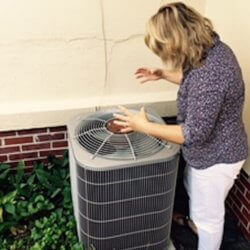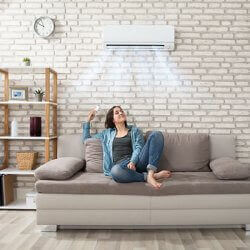
Everyone needs fresh air to stay healthy and happy at home. While we often assume that air pollution is a problem that only affects the outdoors, indoor air quality is a significant risk for many homes. In fact, in a lot of places, indoor air quality is actually a lot worse than what is outside. Thankfully, there is a lot you can do to keep the air in your home clear and healthy.
Whether it is an addition to your HVAC system or other changes to air flow in your home, addressing indoor air quality can vastly improve the health of you and your family. A good place to start is by having a trusted heating & air conditioning company take a look at your HVAC system to see if there are any obvious issues to address.
It might seem silly to have such an assessment done if your system appears to be working fine, but the micro-particles that are responsible for indoor air pollution are hard to spot. They may not start causing noticeable problems for the machines themselves right away, or ever. But rest assured, if left unaddressed, these tiny contaminants will have a negative effect on your indoor air quality and ultimately your health.
The Impact of Indoor Air Quality on Health
Indoor pollutants can come from a lot of places. Indoor air quality is affected by everything from mold and pet dander to building materials and even humidity. What is worse is that some contaminants magnify the effects of others — so keeping indoor air quality in check is important, as things can quickly get out of hand.
A few of the health issues associated with indoor air pollution include:
- Allergies
- Asthma
- Stress
- Lung disease
- Headaches
- Upper respiratory congestion
- Fatigue
- Dizziness
- Chronic coughing
If you do not want to be at risk for these and other medical issues, it is as simple as checking your indoor air quality and taking a few easy steps to boost the ventilation in your home. Two easy areas to address with HVAC upgrades are humidity and air recovery.
How to Improve Air Quality & Stay Healthy in Your Home

With simple upgrades to improve the humidity and air recovery in your home, you are targeting processes that can affect a number of pollutants, giving you more control of the indoor air quality in your home and better results. Steps include:
- Add a Humidifier and Humidistat: Humidity has a huge effect on indoor air quality. High humidity, for instance, can encourage the growth of mites and mold that contribute to air pollution. If the humidity is too low though, it will impact the body’s ability to deal with infection and disease. You want to aim for the sweet spot of about 50 percent. Adding a humidistat and humidifier is an easy way to get more control over the humidity in your home.
- Use a Heat Recovery Ventilation System: Upgrading to a Heat Recovery Ventilation system brings more fresh air into the home while still re-capturing energy to heat and cool your home. The amount of fresh outdoor air brought in is going to vary with every system, but an HVAC professional can help you determine ways to increase air flow through your system and maximize fresh air being brought in.
Contact Galmiche & Sons for Your Indoor Air Quality Concerns
If you would like to evaluate your home’s indoor air quality and take steps towards improving it, give us a call. As a long-established St. Louis heating & air conditioning company, we look forward to working for you.









